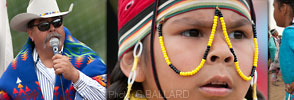April 17, 2020
The Honorable David L. Bernhardt
Secretary of the Interior
U.S. Department of the Interior
1849 C Street,
NW Washington, D.C. 20240
The Honorable Steven Mnuchin
Secretary of the Treasury
U.S. Department of the Treasury
1500 Pennsylvania Avenue,
NW Washington, D.C. 20220
Re: To Ensure that the Coronavirus Relief Fund is Disbursed to Tribal Governments and Demanding the Recusal of Assistant Secretary for Indian Affairs Tara Sweeney
Dear Secretary Mnuchin and Secretary Bernhardt:
I write on behalf of the California Tribal Chairpersons' Association (“CTCA”) to write to urge that the U.S. Department of the Treasury (“Treasury”) exercise its authority under Title V, Section 5001 (“Title V”) of the recently passed Coronavirus Aid, Relief, and Economic Security (“CARES”) Act, to ensure that the Coronavirus Relief Fund (“CRF”) is disbursed to bona fide Tribal governments and not Alaska regional or village corporations... DOWNLOAD ORIGINAL PDF CTCA LETTER
Sincerely,

Bo Mazzetti
California Tribal Chairpersons’ Association

|
| April 17, 2020
The Honorable Mitchell McConnell
Senate Majority Leader
United States Senate
S-230 U.S. Capitol Building
Washington, DC 20510
The Honorable Charles Schumer
Senate Minority Leader
United States Senate
S-221 U.S. Capitol Building
Washington, DC 20510
The Honorable Nancy Pelosi
Speaker of the House
U.S. House of Representatives
1236 Longworth, H.O.B.
Washington, DC 20515
The Honorable Kevin McCarthy
House Minority Leader
U.S. House of Representatives
2468 Rayburn, H.O.B.
Washington, DC 20515
Re: SBA Paycheck Protection Program - Need for Amendment to Respect Congressional Intent to Provide Relief for “Any Tribal Business.”
Dear Senate Majority Leader McConnell, Senate Minority Leader Schumer, Speaker Pelosi and House Minority Leader McCarthy:
I write on behalf of the California Tribal Chairpersons’ Association (CTCA) to request that Congress include an amendment in the next COVID-19 Bill to clarify that “Any Tribal Business” that meets the size standards for the Paycheck Protection Program is eligible to receive assistance to maintain employees during the National Public Health Emergency, including small tribal gaming businesses... DOWNLOAD ORIGINAL PDF CTCA LETTER
Sincerely,

Bo Mazzetti
California Tribal Chairpersons’ Association

|
| April 8, 2020
SUBMITTED TO:
The Honorable Steven T. Mnuchin
Secretary of the Treasury
U.S. Department of the Treasury
1500 Pennsylvania Ave.
NW Washington, D.C. 20220
The Honorable Tara Sweeney
Assistant Secretary for Indian Affairs
U.S. Department of the Interior
1849 C Street
NW Washington, D.C. 20240
Re: Coronavirus Relief Fund, Tribal Set-Aside of $8 Billion
Dear Secretary Mnuchin and Assistant Secretary Sweeney,
On behalf of the California Tribal Chairpersons’ Association (the “CTCA”), we write to submit the following comments on the implementation of the $8 billion earmarked for Tribal governments in the Coronavirus Relief Fund as outlined in the Coronavirus Aid, Relief, and Economic Security Act (CARES ACT). This letter amends and clarifies our letter sent to you on April 2, 2020.
The CTCA is a non-profit corporation, consisting of federally-recognized tribes (represented by tribal chairpersons and vice-chairpersons) from across the State of California. One of the purposes of the CTCA is to advocate for tribal governments with respect to federal, state and local laws, regulations, policies and practices. Additionally, all of our member tribes have faced significant challenges and economic loss in responding to the novel COVID-19 pandemic. We therefore thank you for the opportunity to provide comments on the proper allocation of these funds.
Tribal governments are fully engaged in supporting the needs of our tribal citizens, coordinating with federal, state and local governments, and responding to the numerous conference calls and administrative work necessary to receive the benefits of the COVID-19 legislation.
CTCA joins the California Nations Indian Gaming Association (CNIGA) and Tribal Alliance of Sovereign Indian Nations (TASIN) in respectfully requesting that the distribution of these funds factor in wage or employment data since employees are far and away the largest expenditure of any tribal business. This data can be self-reported and/or verified by referencing the W-3. Alternatively, Interior and Treasury could reference data provided by a Unified Audit. By basing the funding formula on this data, your Departments will ensure that the formula follows the plain reading of the statute and congressional intent. The CTCA endorses the following funding distribution formula:
- STEP 1: Provide a $1,000,000 minimum distribution to each Tribe to ensure that even the smallest Tribes have funding to address their economic needs during the pandemic.
- STEP 2: Distribute $1,500,000,000 to each Tribe pro rata based on each Tribe’s enrolled tribal member population to ensure that larger Tribes have additional funding to address their economic needs.
- STEP 3: Distribute the remainder of the $8,000,000,000 fund to each Tribe pro rata based on economic impact, measured by total wages paid by the Tribe and all of its wholly owned enterprises in 2019. If requested to do so, Tribes may be required to self-certify.
This formula directly advances the economic stabilization purpose of the CARES Act by relying primarily on an objective indicator of tribal economic activity that is a current and accurate measure of the impact COVID-19 is having on each Tribe’s economy. Moreover, the proposed formula addresses all Tribes’ government stabilization needs, regardless of whether a Tribe has commercial enterprises, as it also accounts for wages paid to tribal government employees.
Our tribal communities are vulnerable populations because our tribal citizens include a high number of elders and those with underlying health conditions, and because of the historical underfunding of tribal governments, tribal health needs, and Indian programs. Our housing is overcrowded, often with multi-generational and multi-family households. Our tribal citizens lack adequate access to adequate healthcare and sanitation. The potential for significant adverse impacts of COVID-19 on our tribal citizens cannot be understated. Elected tribal leaders and our officials are in the best position to understand the expenditure needs and priorities of our tribal community.
Thus, the CTCA recommends that a tribe’s use of all funds pursuant to Section 601(d) be deemed allowable expenses as “necessary expenditures incurred due to” COVID-19 pandemic and other provisions of this section by its acceptance of such funds. The definition for tribal lands that are eligible for expenditure of funds should be broad and include all reservations, tribal lands, allotments, and fee simple parcels where tribes hold title or a leasehold interest.
Distribution of funds to tribes should be completed as soon as possible, and we recommend utilizing existing mechanisms for distribution of funds, such as ISDEAA Title I contracts and Title IV agreements.
The CTCA recommends that the following considerations be included in the methodology for the remaining balance of the tribal distribution made by formula:
- Inability to fund crucial government services, such as Tribal Assistance for Needy Families (TANF), due to complete loss of revenue from shuttered tribal enterprises
- Payroll costs for government employees and enterprise employees
- Cost differentials of remote and isolated locations, and particularly off-grid tribal lands, such as high energy costs, fuel, food security, and medical costs
- Non-congregate sheltering expenditures to alleviate the high risk in overcrowded, multi-generational, and often multi-family, households, or to establish shelters for those citizens presumed infected due to exposure to infected individuals, or to quarantine infected individuals awaiting transport to appropriate health care facilities
- Long unmet needs that are now a health hazard such as lack of public safety and law enforcement; child welfare, domestic violence, and social services; and infrastructure improvements needed including water, road, and sewer improvements
- Increased broadband communication needed for the following: operation of tribal government activities as
COVID-19 programs from federal and state governments are relying heavily on online communications, and many tribal workers are working at home without access to adequate or any broadband services; for implementation of telemedicine and telehealth services, search and rescue, public safety, law enforcement, and first responders
- Increased telecommunications costs
The CTCA requests the funding be available directly to tribal governments, tribal organizations, and existing Indian Self-Determination and Education Assistance Act agreements. Lastly, CTCA recommends that the Department of the Interior and the Department of the Treasury issue their proposal and guidance regarding distribution of the funds next week and schedule another consultation session to ensure that Tribes have an opportunity to provide comments prior to distribution of the funds. While we support a distribution date of April 24, it is important that Tribes have the ability to comment on the proposal and formula in advance so that any issues may be corrected prior to distribution.
Thank you again for the opportunity to submit these comments.
Sincerely,

Bo Mazzetti
California Tribal Chairpersons’ Association

Cc: Regional Associations (Southern, Central and Northern)
DOWNLOAD ORIGINAL PDF CTCA LETTER
|







